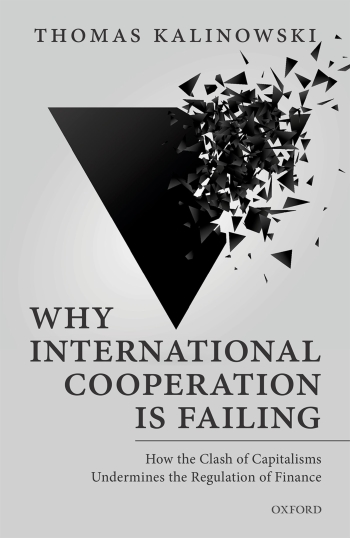
In September, Oxford University Press published a book written by Ewha Womans University Graduate School of International Studies professor, Thomas Kalinowski. The book, “Why International Cooperation is Failing: How the Clash of Capitalisms Undermines the Regulation of Finance,” sheds light on the reason for the fall of international corporations, in relation to domestic origins. The professor stressed the importance of thinking beyond theory.
“The argument I’m making in this book is that international corporations are falling,” Kalinowski said. “After the Global Financial Crisis of 2008, the topic of international financial regulation has become much more prominent. There are increasing numbers of international economic conflicts today, like the US-China trade war. Financial markets are still very volatile, and international corporations haven’t been giving us many solutions.”
He added that in order to gain more understanding of international conflicts related to economic regulation, it is crucial to research the domestic origin of these conflicts. People often get the perception that ideas for international conflict arise from individual leaders. The professor emphasized that in order to understand international conflict with precision, one must think beyond these theory-based perceptions. Rather than focusing on theories such as “individual level of analysis,” it is more important to understand domestic politics, especially regarding the different forms of capitalism.
Professor who publishes a book explaining domestic capitalisms offers insight on changes Korea needs

Though the role of theories is to help understand the world, reallife problems originate from much deeper roots.
Kalinowski explained the international clashes resulting from the difference in the capitalism of East Asian countries, the U.S., and European countries. In addition, he mentioned that instantaneous change in the global level and domestic sector was needed in order to achieve successful international cooperation.
“Korea was one of the few countries that had simultaneously successful economic and political development,” Kalinowski said. “Korea, as a developing country, was able to achieve this partly because it rejected the western, liberal, free market ideology, and protected its domestic markets. The question now is: Is this still a strategy that we should maintain, when Korea is no longer a developing country but a developed country?”
He added that the success of Korea produced several side effects. For example, the Korean economy is not consumer-oriented like American capitalism but is rather producer-orientated. This allows the economic monopoly of large corporations and domination of chaebols, a Korean terminology for large industrial companies that are run and controlled by single families. He suggested several solutions to these problems.
“Korea needs to further open its markets to international products,” Kalinowski said. “That could help balance the economy and give consumers more options and cheaper prices. This could also prevent consumer exploitation.”
The professor stressed that this was not enough to stabilize the economy.
“In addition, Korea needs to provide support to those with very low income. In this sense, it is good to increase minimum wage and basic pension. Korea also needs higher wages in many areas, and stronger labor unions in smaller and medium sized companies.”
The professor stated that it took a total of eight years to write the book. Original ideas for the book expanded from shorter journal articles. When he realized that the big questions could not be answered through these articles, he started writing a book to provide more details and add more examples.
He said that he thought of his graduate students when writing. He wished to give his students a good introduction to the different types of capitalism and explain why this led to international conflicts. He concluded with his message to the students.
“I never had negative experiences working with Ewha students,” he said. “But I have had to explain to them why it’s important to start a discussion. Students here aren’t used to being challenged, and rather try to avoid it. Students should try to understand that challenges are positive.”
He said that through publishing, he wishes to get a discussion started. He stated he is looking forward to constructive criticism to improve his work, and to contribute to the better understanding of the world.

